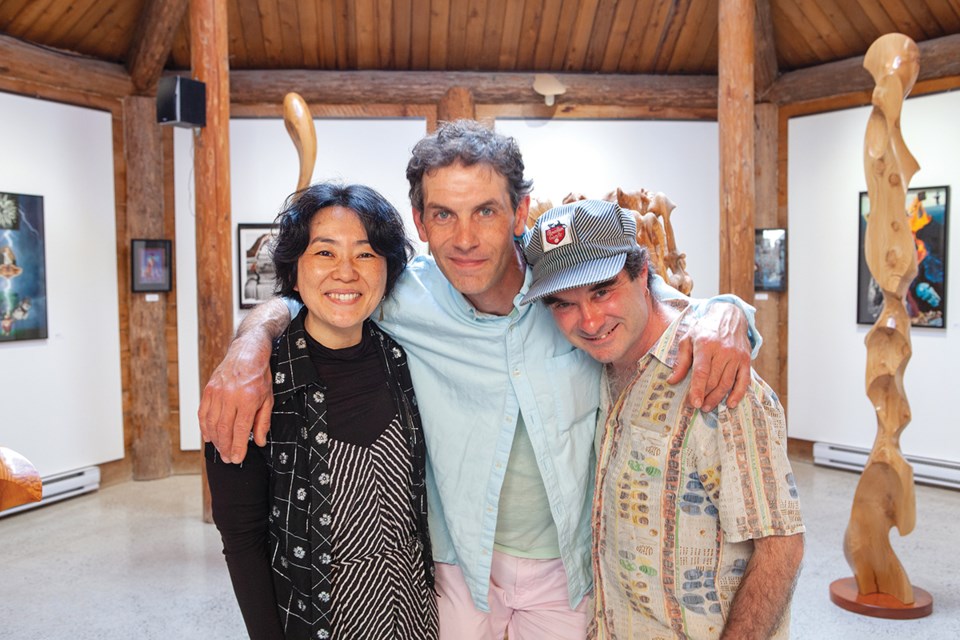Collaboration between three Powell River artists on Transformation, a new exhibition at Sechelt’s Sunshine Coast Arts Centre, provided the impetus for them to push the boundaries of expression in two and three dimensions.
Transformation — which features the work of Scott Evans, Naoko Fukumaru and Conrad Sarzynick — opened with a public reception on June 24. Approximately 40 people (and one canine visitor) attended to hear Evans, Fukumaru and Sarzynick explain their work and the friendship that anchors it.
Sarzynick, who is also a spoken-word artist, performed original poems — including percussive stanzas from his slam-style Go Van Gogh and the more contemplative cadences of Secret Womb.
Sarzynick’s visual craft encompasses similar contrasts. As a self-taught wood carver and collage artist, his works range from the organic — collaborating with Evans to produce the monumental carvings arrayed in Transformation — to intricate composite assemblages that involve the painstaking collection of imagery from printed sources.
To achieve his vision, he spends days locating complementary elements. In one of Sarzynick’s works, Hatch, he blends Eastern and pagan iconography, a timelapse sequence of a chick emerging from an egg, and a floral blossom reaching full flower. The vignettes are superimposed over an arid sandscape in which a tortoise trundles toward the shade.
“If you know what you’re doing, then what’s the point?” said Sarzynick. “It’s about knowing that I have some tools, and if something works here, knowing how to bring that together. It’s not a set goal. You just want it to be good. It’s almost like excavation. You see a mound, and you know there’s a buried dinosaur under there.”
For Naoko Fukumaru, literal excavation was the genesis of her installation of Kintsugi artworks. Kintsugi is the traditional Japanese discipline of knitting together shards of broken pottery using lacquer dusted with powdered gold.
Fukumaru was born in Kyoto, Japan to a family in the business of antique auctions. Her great-grandfather collected unwanted broken objects by wheelbarrow and repaired them at home.
The fragments for her Kintsugi elements were gathered from a kiln site in Roberts Creek. Michael Henry and Martin Peters established Slug Pottery there in 1972, depositing broken ceramics in a pile near the workshop. Fukumaru, with Henry’s permission, began digging for shards in 2021. In addition to the fused fragments with golden seams, Fukumaru’s installation includes a midden-like circle of fragments recovered from the Slug Pottery site.
“We all have suffering and difficulties and uniqueness,” said Fukumaru, who has worked as a professional ceramic and glass conservator at institutions in New York, Europe, Egypt and Japan. “Kintsugi reminds us that it’s okay to be broken, and that we can find beauty in brokenness.”
For painter and sculptor Scott Evans, who studied at Emily Carr University of Art and Design, the union of dissimilar and contrasting materials leads to serendipity. Plastic baubles adorn his wing-crowned Baby Angel, whose skull-like physicality is transfigured by the ersatz gems. In Sunset in Valhalla, a star-speckled cosmos rendered in green and gold juts from the frame toward the viewer.
“As an artist, you pay attention to the invisible energies in things,” Evans said. “It’s not science. Whether it’s the materials or the instinct, something unexpected happens.”
The creative conversation between Evans, Fukumaru and Sarzynick continued during the setup of the exhibition. They spent several days onsite installing the artworks, and the last labels were put in place minutes after the first guests arrived.
“We worked together and we supported each other,” said Fukumaru. “We wanted to take on a big challenge. We had a goal and we had pressure. Instead of working alone, we know that together, creatively and mentally, we could do much better.”
Transformation remains open to the public at the Sunshine Coast Arts Centre in Sechelt until August 14. Admission is by donation.



